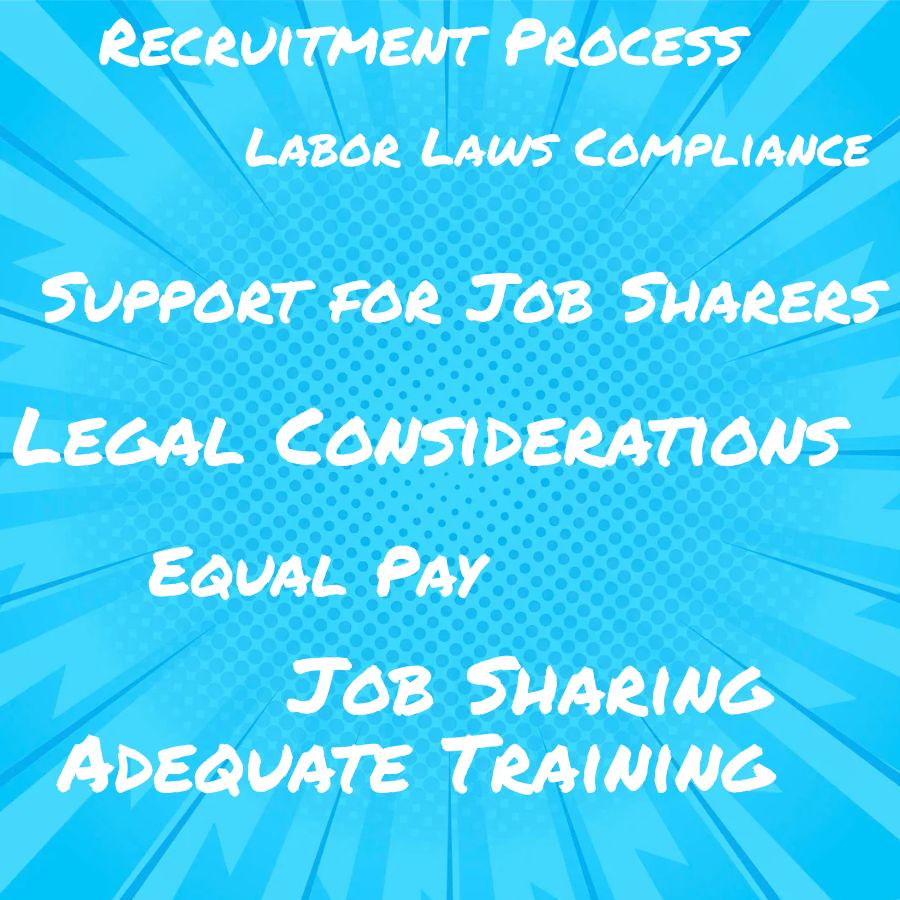Legal considerations when recruiting for job sharing roles include ensuring compliance with relevant labor laws, such as those relating to equal pay, minimum wages, and discrimination; ensuring that the job sharing arrangement does not violate any collective bargaining agreements; and confirming that the roles are suitable for job sharing.
Job sharing is a great way to increase flexibility in the workplace and provide more opportunities for employees. However, there are some important legal considerations when recruiting for job sharing roles that employers need to be aware of.
In this blog post, we’ll explore what these considerations are and how employers can ensure they’re compliant with relevant laws and regulations.
Fairness in Recruitment Process

This means that employers must ensure that all applicants are treated equally and fairly throughout the recruitment process, regardless of their gender, race, age or any other protected characteristic. Employers should also make sure that they do not discriminate against any applicant based on their experience with job sharing roles in the past.
All applicants should be given equal opportunity to demonstrate their skills and qualifications for the role. Furthermore, employers should provide clear information about what is expected from a successful candidate and how they will be evaluated during the selection process.
Employers must ensure that all decisions made during the recruitment process are based solely on merit and not influenced by any personal biases or prejudices.
Equal Pay for Job Sharers
This means that employers must ensure that any two people who are sharing a role receive the same rate of pay, regardless of their gender, race, or other protected characteristics. Employers should also consider whether the job sharers have similar qualifications and experience levels to ensure they are being paid fairly.
Employers should be aware of any applicable state or federal laws regarding equal pay for job sharers and make sure they comply with them. Employers should document all decisions related to equal pay in order to protect themselves from potential legal action if there is ever a dispute over wages.
Ensuring Compliance With Labor Laws
Employers must be aware of the various labor laws that apply to their organization and ensure they are adhering to them when hiring new employees. This includes understanding the minimum wage requirements, overtime pay regulations, and other employment-related regulations such as those related to discrimination or harassment in the workplace.
Employers should also be aware of any state or local laws that may affect their recruitment process. It is important for employers to understand these legal considerations before beginning a job search so they can make sure they are compliant with all applicable laws and regulations.
Adequate Training and Support for Job Sharers
This means providing them with the necessary resources and guidance they need to be successful in their role. It also involves ensuring that both job sharers have a clear understanding of their responsibilities and how they will work together as a team.
Employers should provide ongoing support throughout the duration of the job sharer’s employment, such as regular check-ins or feedback sessions. This helps ensure that any issues or concerns can be addressed quickly and effectively so that both parties can continue working together successfully.
Establishing Clear Roles and Responsibilities of Each Job Sharer
This means that the employer should clearly define what tasks each job sharer will be responsible for, as well as how they will work together to complete the overall role. It is also important to ensure that both job sharers are aware of their respective duties and have agreed upon them before beginning the role.
Employers should consider any legal implications of having two people in one position, such as potential conflicts of interest or liability issues. By establishing clear roles and responsibilities upfront, employers can help ensure a successful job sharing arrangement while avoiding any potential legal issues down the line.
Setting Up a System to Manage the Transition Between Job Sharers
This system should ensure that both parties are aware of their responsibilities and that any changes in the arrangement are communicated clearly. It should also provide a framework for resolving any disputes or disagreements that may arise during the course of the job sharing arrangement.
The legal considerations when setting up such a system include ensuring compliance with relevant employment laws, including those related to equal pay and discrimination; making sure all necessary paperwork is completed correctly; and providing clear guidelines on how decisions will be made regarding changes in hours or duties. Employers must consider whether they need to obtain consent from existing employees before introducing a job-sharing scheme into their workplace.